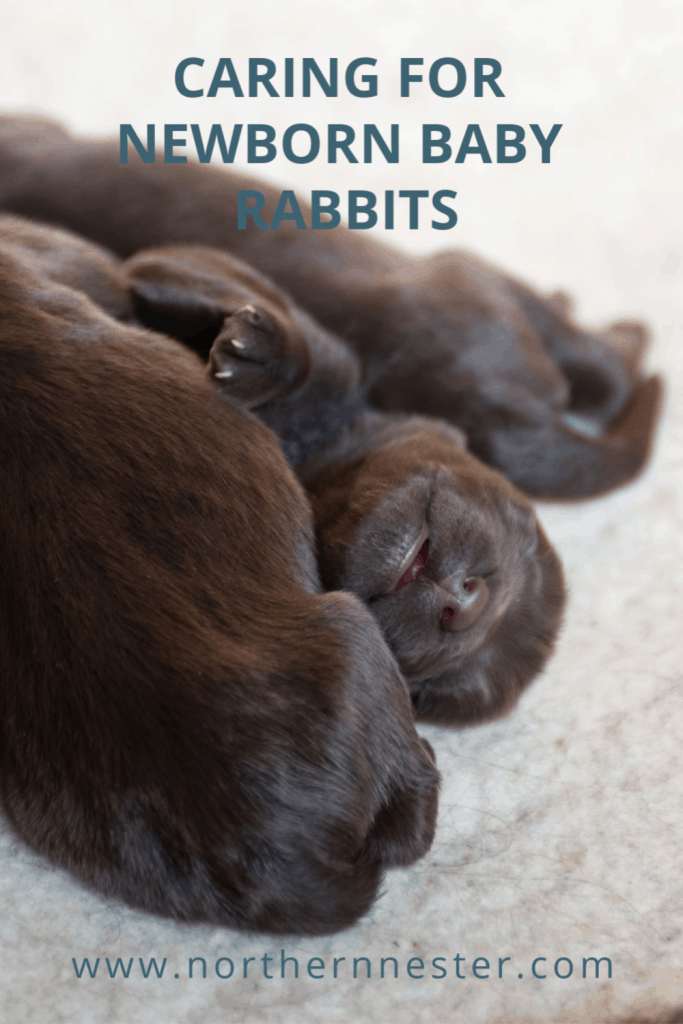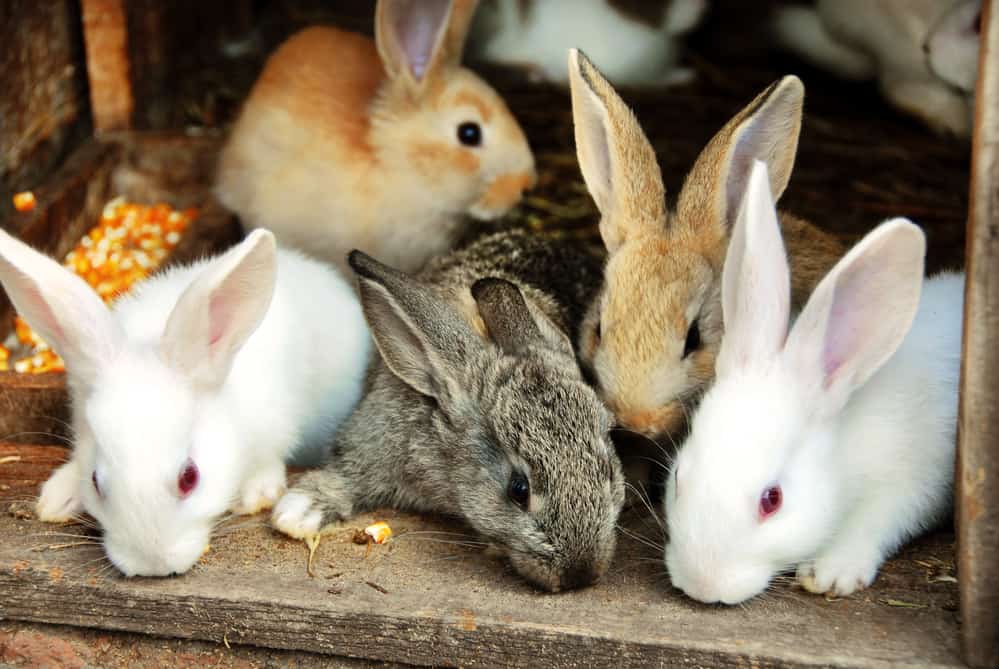
Whether you have accidentally found a rabbit nest, or you are caring for pet rabbits, newborn baby rabbits require special care and attention.
In most cases, their mother knows best, but if you have to help out and care for a baby rabbit, here’s what you need to know.
Caring for Newborn Baby Rabbits
If you find a nest of wild baby rabbits, the best thing to do is leave them where you found them.
If you know that the baby rabbits are orphaned, they should be taken to a wildlife rehabilitation or a veterinarian; you shouldn’t try to care for them on your own.
If you have newborn baby domestic rabbits, here is how to care for them.
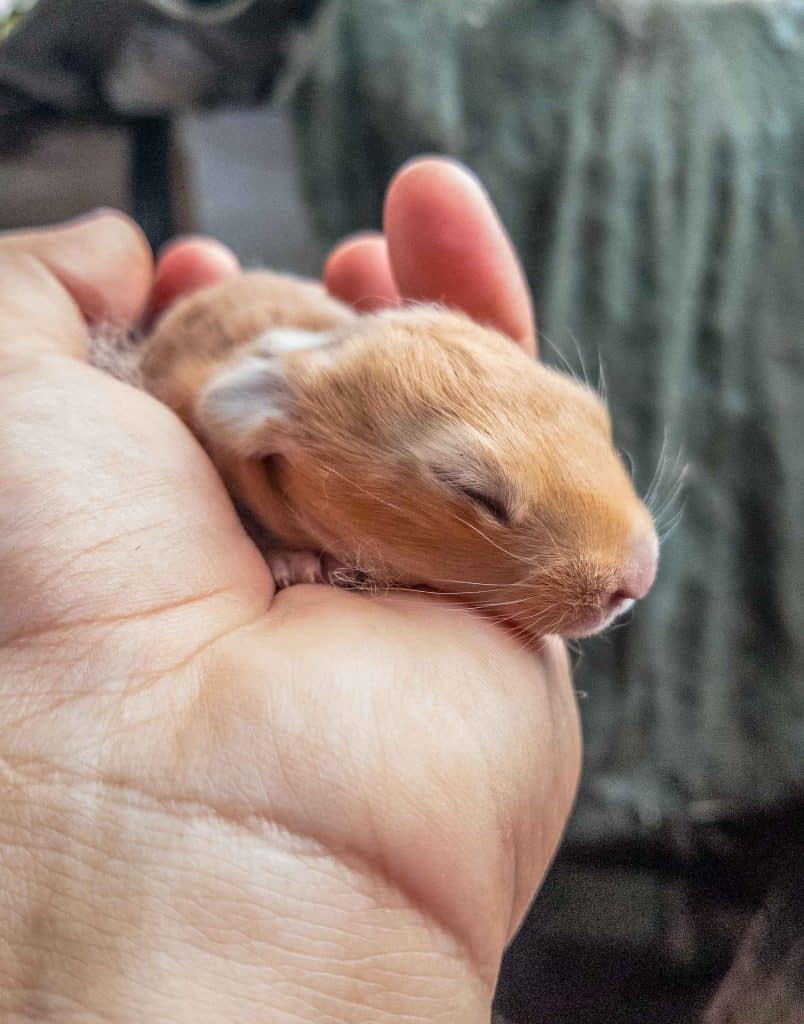
Nesting for baby rabbits
Provide a soft, clean nest in a box, and cover the babies with a clean towel. Keep them covered and the box dark until their eyes open.
The box should be kept in a room that is 65-70°, but not warmer.
If the box is in a cold room, you may place an electric heating pad set on low or a warm hot water bottle beneath part of the box or bedding, but always give the baby rabbits room to move away to a cooler spot if they need to.
Related Content: How to Litter Train Rabbits, start them young!
Feeding baby rabbits
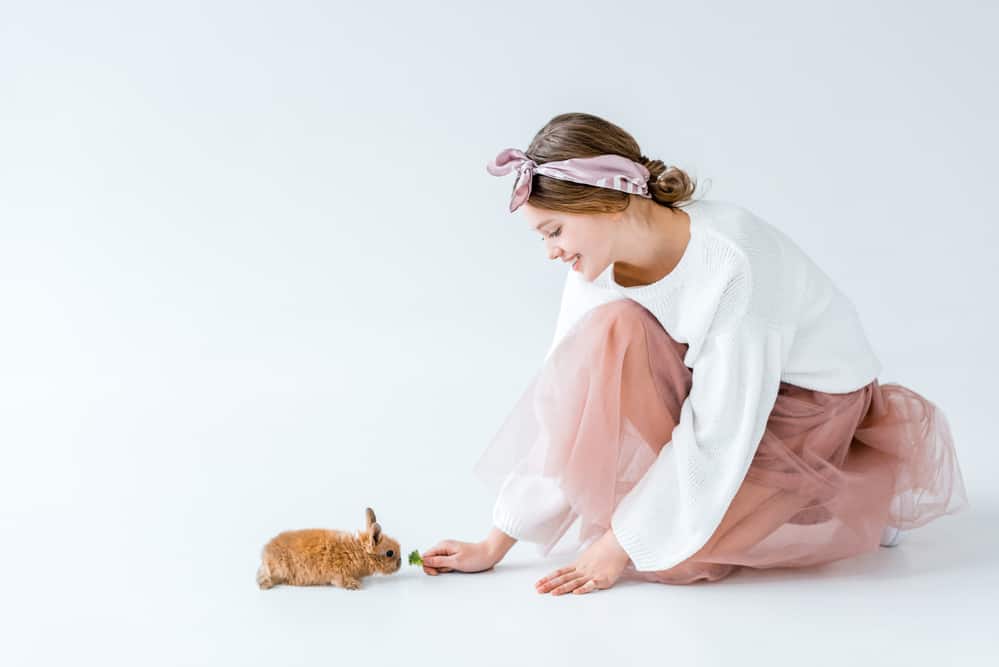
Feed baby rabbits KMR Kitten Powder Formula using a small syringe or an eyedropper.
Feed baby rabbits with their bodies upright, with the syringe, pointed downward and a bit sideways, so that excess formula drips out of the side of their mouths, rather than down their throats.
Baby rabbits should be fed twice a day, in the morning and evening.
Amounts to feed domestic baby rabbits:
- Newborn: 2.5 cc per feeding
- One week: 6-7 cc per feeding
- Two weeks: 12 -13 cc per feeding
- Three through six weeks or weaning: up to 15 ccs per feeding
Each individual baby will have their preferences, and smaller rabbits will eat less per feeding. Do not overfeed baby rabbits.
After their eyes are open, you can begin introducing small amounts of rabbit food pellets or hay into their box, to help them transition to adult food.
After each feeding, baby rabbits need to be stimulated to urinate and defecate.
Use a cotton ball or the corner of a clean towel, moistened with warm water.
Gently stroke the anal area until the baby rabbit begins to urinate and defecate, and keep stroking until they stop.
A mother rabbit would normally lick their babies to stimulate them in this way, so it’s important to mimic this behavior until they are old enough to urinate and defecate on their own after every feeding.
How to Tell if a Newborn Baby Rabbit is Orphaned
In the wild, a mother rabbit stays away from her babies, to avoid attracting predators to the nest.
She only visits them once or twice a day, usually at night, and only for a few minutes at a time for feeding.
She may only visit the nest for a total of 5 minutes a day.
So it’s very common for people to think that baby rabbits have been abandoned and aren’t being cared for, when in fact the mother is obeying her instincts to protect the nest.
Before you disturb a nest or remove the babies, it’s important to be SURE that they are abandoned or orphaned.
Baby rabbits are difficult to care for, even by trained rehabbers, and removing them from their nest puts them in greater danger.
Even if you watch a rabbit’s nest closely and don’t see the mother attending the babies, it doesn’t mean they aren’t being cared for.
Here’s how you can tell if newborn baby rabbits are orphans and need help:
Look at the baby bunnies
They should have skin that is healthy and pink or red. Their skin should not be bluish or greyish. The babies should be warm to the touch
Observe the baby rabbits’ stomachs
Their stomachs should be round and healthy, not sunken in
Monitor their sounds and activity.
The babies should have normal, wiggling movement, but be quiet most of the time.
They may start to cry a few minutes before feeding time.
If they are still and sluggish, or cry for extended periods, they may not be being fed
Check for dehydration
Gently pinch their skin together at the nape of their necks. If the skin smooths down flat again, they are well hydrated.
If the skin remains tented, they are dehydrated.
If you think that baby bunnies may be orphaned or abandoned, but aren’t sure, cover the nest up again as you found it.
Then cover the nest with twigs or sticks in a distinctive pattern that you will recognize.
Use a close/tight pattern, because a mother rabbit is discreet and won’t disturb the nest too much when she visits.
If you come back the next day and the twigs haven’t been disturbed, and the babies aren’t healthy, it is probably time to call a professional.
**Want to learn how to walk rabbits? Check out our comprehensive guide about walking rabbits on leash here!**
What to do if You Find Baby Rabbits
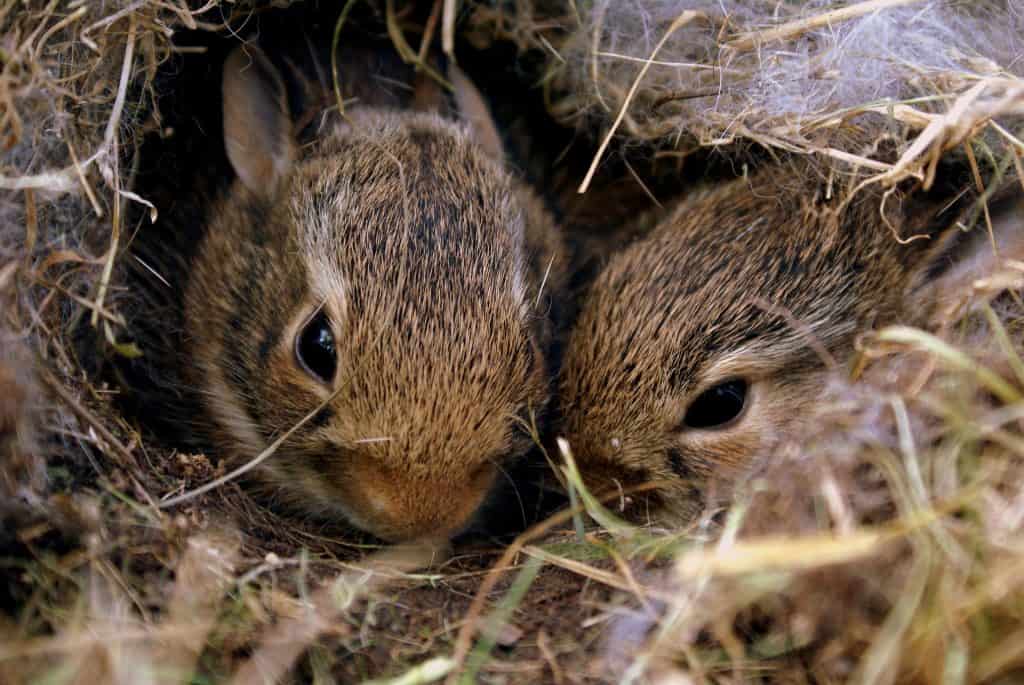
If you are keeping domestic rabbits, and your baby bunnies aren’t doing well and need medical care, it’s best to contact a veterinarian who is skilled at caring for rabbits.
When you start keeping rabbits as pets, it’s a good idea to contact your local veterinarians to find one who can treat rabbits, so that you have their contact information when you need it.
Search google for “exotic pet” veterinarians, or check this list from the House Rabbit Society:
https://rabbit.org/vet-listings/
For wild rabbits, you should contact a local wildlife rehabilitation center before disturbing the nest.
Check this list from the Humane Society:
https://www.humanesociety.org/resources/how-find-wildlife-rehabilitator
Related Questions
Can you touch a newborn baby rabbit?
In most cases, you can gently touch a newborn baby rabbit if it’s a pet rabbit and the mother is calm.
You should not touch a newborn wild rabbit unless you are sure it has been orphaned and needs human care.
Can baby bunnies drink water?
Baby bunnies will start to drink water at about 3-4 weeks old, and you can give them a very shallow bowl of water to drink from while they are small.
Babies usually rely on their mothers to show them how to drink from a water bottle, and you may need to lower the water bottle or make a little ramp to make it easier for babies to reach as they get older.
Can baby rabbits drink cow milk?
No, cow’s milk isn’t good for baby rabbits.
Mother rabbits spend less than 5 minutes a day feeding their babies, so rabbit milk is extremely nutritious and has special enzymes babies need.
Baby rabbits may not be able to digest cow’s milk, and it may not have all the nutrients they need. Instead, feed baby rabbits a Kitten Milk Replacer formula, or goat’s milk.
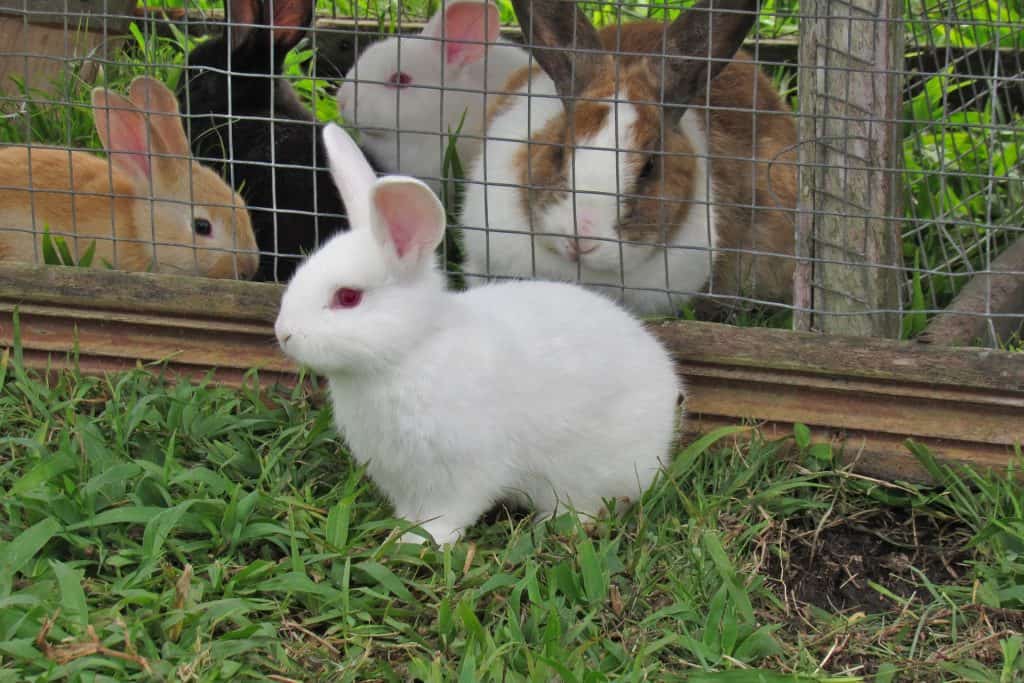
How long can baby bunnies go without food?
At most, baby rabbits can go without food for 3-4 days.
In nature, most baby bunnies are fed only once a day, between midnight and 5 a.m.
And, unlike many animals, rabbits do not nurse their young right after their born – their mother feeds them the following night.
How do you feed a baby rabbit with a syringe?
To feed a baby rabbit with a syringe, remember that mother rabbits stand over the nest, and babies reach upright to feed.
Hold the baby rabbits upright, with the tip of the syringe pointed downward and slightly to the side of their mouths.
Gently squeeze the formula out into their mouths, going slowly.
Do not overfeed baby rabbits, but if they aren’t eating enough, you can offer food more frequently during the day.
Because mother rabbits spend so little time at the nest, it’s common for people to think that baby rabbits are abandoned or orphaned when they really aren’t.
For pet rabbits, don’t try to force the mother to sit or stay at the nest. If the babies have good skin tone and color, are warm and wiggling, and don’t make much noise, they are probably fine and getting all the care and food they need.
If you find a nest of wild baby rabbits, call a local wildlife center before you disturb the nest.
Baby rabbits are adorable, but not easy to care for, so it’s best left to a professional when possible.
